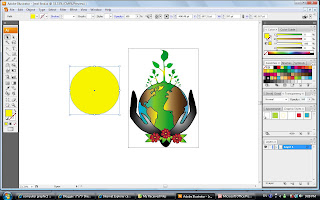
As you can see there are a pair of hands holding the earth. This is reminding the people to protect the earth without any complaint. Then you can see there is a raw of tree from small to big. These are appealling the people to plant the tree because earth nowadays is lacking of tree to produce the oxygen and to reduce the rate of carbon dioxide. Besides that, it also help in global warming to prevent the earth getting hotter and hotter. The trees also bring the meaning of hope. I make the trees from small to big because I am hoping the earth can get better and better in the future with the help of people. There is nothing impossible; just you are willing to do or not! Lets us protect the earth from today!
.bmp)
.bmp)
.bmp)
.bmp)
.bmp)
.bmp)
.bmp)
.bmp)
.bmp)
.bmp)
.bmp)
.bmp)
.bmp)
.bmp)
.bmp)
.bmp)
.bmp)
.bmp)
.bmp)





